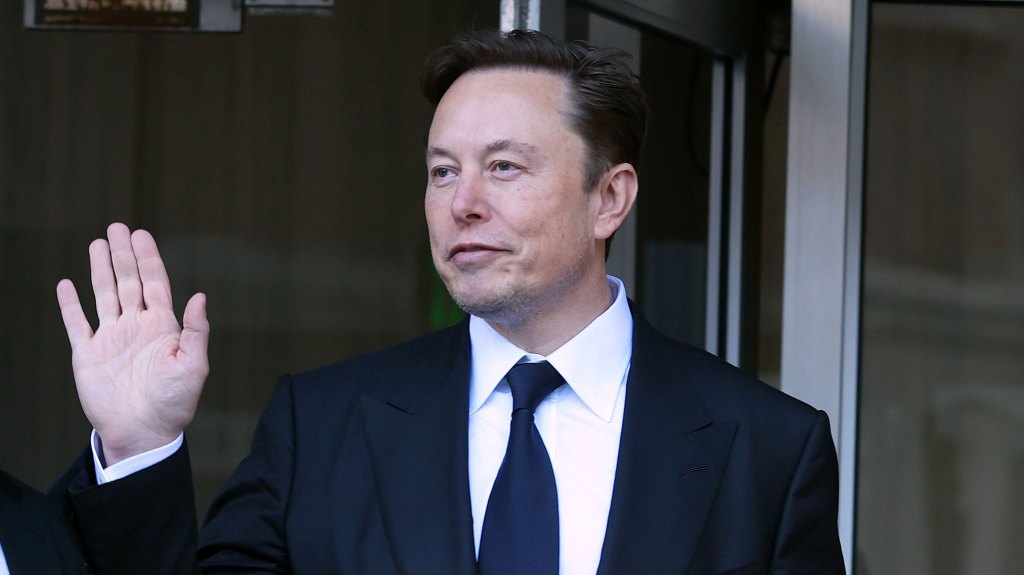
Tesla has spent around $200,000 on advertising through February on Elon Musk’s social media platform, X, after the CEO caved to shareholder pressure last year and said his company would “try a little advertising.”
Since then, Tesla ads have showed up in places like Google search results and on YouTube. But it was also increasingly apparent that Elon’s car company was paying Elon’s social media company to advertise, too. We now know how much Tesla paid X thanks to details released Wednesday in its annual proxy statement, which includes a section on “related person transactions” the company has made. (Tesla has not disclosed how much it has spent on advertising overall.)
Tesla also paid X around $50,000 in 2023 and $30,000 through February 2024 for “commercial, consulting and support agreements.” Likewise, X paid Tesla $1 million in 2023 and around $20,000 through February 2024 for the same unspecified work. Tesla doesn’t say exactly what those agreements entail, but the companies have reportedly shared or loaned employees following Musk’s acquisition of X and his increased focus on building AI products at each business.
Essentially, all of Musk’s companies have engaged in transactions like these over the years, and 2023 was no different. The proxy filing shows that SpaceX paid Tesla $2.1 million in 2023 and approximately $800,000 through February 2024 for “certain commercial, licensing and support agreements with Tesla.” Tesla, meanwhile, paid SpaceX $700,000 in 2023 and $100,000 through February 2024 for the use of a corporate jet owned by Musk’s space company. Tesla paid Musk’s tunneling effort, The Boring Company, $200,000 in 2023 and $1 million through February 2024.
Curiously, Tesla says that in December 2023, it hired a security company owned by Elon Musk to provide security services for him, “including in connection with his duties to and work for Tesla.” The company says that already cost $2.4 million in 2023 and around $500,000 through February 2024. It adds that this is only “a portion of the total cost of security services concerning Elon Musk.”
Finally, Tesla also says it was paid $11.5 million in 2023 and around $6 million through February 2024 for scrap materials by EV battery recycling company Redwood Materials, which is run by Tesla board member (and former CTO) JB Straubel.
Texas reincorporation
All of this financial back-and-forth comes as Musk is still in the middle of trying to appeal a recent decision by the Delaware Chancery Court that struck down his massive 2018 stock compensation plan. The judge made that decision in part because she believed Tesla “inaccurately described key directors [of Tesla’s board] as independent and misleadingly omitted key details about the process” of putting the package together.
Musk was furious with the decision and posted on X shortly after that Tesla would “move immediately to hold a shareholder vote to transfer state of incorporation to Texas,” where Tesla has already relocated its physical headquarters.
The proxy reveals that Tesla’s board started a process shortly after to evaluate the idea — they also say they had previously considered moving the company’s state of incorporation, but never decided to — because “redomestication is a Board decision, not a decision for a chief executive officer.” A special committee was formed, led by board member Kathleen Wilson-Thompson. She hired two lawyers from Sidley Austin to represent the committee and engaged an expert lawyer from Delaware, a Chicago law professor, and Houlihan Lokey as financial adviser to help with the process. They also set out to determine what to do about re-voting on Musk’s struck compensation package.
Over eight weeks, Wilson-Thompson’s committee met 16 times for more than 26 hours, and Tesla says she personally spent “more than 200 hours” working on the matter. The Sidley lawyers spent “more than 600 hours each” on the matter and were supported by “more than 40 other Sidley lawyers.” Through this process, seven board directors and five members of Tesla’s management were interviewed.
Tesla goes into detail about how multiple states were considered, before narrowing down to Texas since companies tend to either be incorporated in Delaware or their home state. And the decision was ultimately made to put the move and the “re-ratification” of Musk’s stock plan up to a shareholder vote at the company’s annual meeting, which will now take place on June 13. While it’s hard to imagine either of those votes failing, they are likely to stir up even more legal debate after that vote takes place. Musk and his brother Kimbal, who is a board member, are recused from voting on the move “because of [Musk’s] prior posts on X about reincorporation.”
“The Committee and its counsel are aware of the media narrative regarding Musk, Tesla, and its Board,” the committee writes in the proxy. “And the Committee’s work was conducted against a backdrop of unrelenting public interest in whether Tesla would reincorporate and in Musk’s compensation. Far from being influenced by these factors, this outside narrative and attention intensified the commitment of the Committee and its counsel to conduct a staunchly independent process.”
This story originally misstated who was getting paid in the arrangement between Redwood Materials and Tesla. Redwood Materials has paid the money to Tesla.


